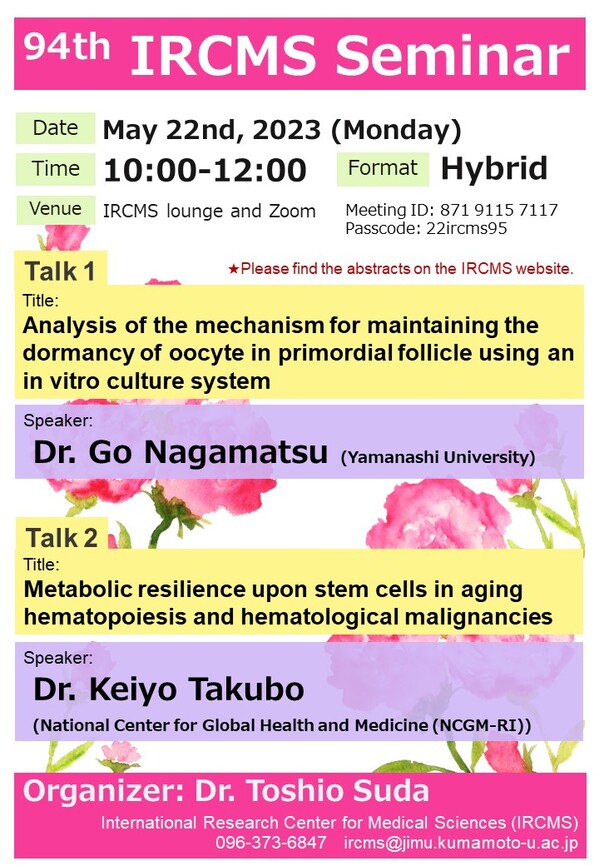- HOME
- News & Events
- [May. 22] 94th IRCMS Seminar
News & Events
[May. 22] 94th IRCMS Seminar
May 1 2023
Notice: Dr. Takubo is cancelled due to a medical emergency.
Thank you for your understanding.
We would like to inform you that the 94th IRCMS seminar has been scheduled as below.
* This IRCMS seminar is open to everyone.
Date : May 22nd, 2023 (Monday)
Time : 10:00-12:00
ZOOM : Meeting ID: 871 9115 7117
Passcode: 22ircms95
Talk 1.Dr. Go Nagamatsu (Yamanashi University)
"Analysis of the mechanism for maintaining the dormancy of oocyte in primordial follicle using an in vitro culture system"
Abstract :
Germ cells are the only cells that transmit genetic information to the next generation, especially, oocytes play a central role in embryonic development. The oocytes are originated from primordial germ cells, and during fetal development, they undergo meiosis. Therefore, after birth, the number of oocytes does not increase, and a limited number of oocytes are maintained in primordial follicles while some are activated to sustain the reproductive period. Previously, we established an in vitro culture system that reproduces the developmental process of oocyte and induces mature eggs that become the next generation after fertilization. However, unlike in vivo development, primordial follicles were not formed in this in vitro culture system. We considered that there are environmental factors that cannot be reproduced in the in vitro culture and focused on the ovarian cortex where primordial follicles exist. As a result of a series of analyses, we found that primordial follicles are physically under pressure surrounded by abundant extracellular matrix in the ovarian cortex, and that physical pressure promotes the nuclear localization of FOXO3, a transcription factor essential for maintaining dormancy. Based on these findings, we succeeded to induce primordial follicles in vitro. In this presentation, I would like to present the approach to elucidate the mechanism for preserving oocyte in primordial follicles using in vitro culture and the latest live imaging.
Talk 2.Dr. Keiyo Takubo ( National Center for Global Health and Medicine (NCGM-RI))
"Metabolic resilience upon stem cells in aging hematopoiesis and hematological malignancies"
Abstract :
Energy metabolism controls hematopoietic stem cell (HSC) cycling and differentiation. Previous reports have shown that both glycolytic and mitochondrial metabolism maintain the balance between HSC quiescence, proliferation, and differentiation. Although it is now clear that old HSCs have increased reactive oxygen species production, decreased mitochondrial membrane potential, and defective clearance of damaged mitochondria, overall metabolic changes in old HSCs and the basis for the increase in HSC pool size during aging are poorly understood. Moreover, it is not known whether stem cells in aging-related hematological diseases, myelodysplastic syndrome (MDS) and myeloproliferative neoplasms (MPNs), experience metabolic changes like those of old HSCs, or whether these changes are involved in pathogenesis of MDS or MPN. To approach these issues, we utilized real-time adenosine triphosphate (ATP) analysis in conjunction with high-sensitivity glucose tracer analysis and 13C metabolic flux analysis (13C-MFA) to investigate metabolic network changes and molecular mechanisms underlying acquisition of fitness by old HSCs. We discovered that old HSCs acquire mitochondrial resilience in ATP production, independent of mutations typically reported in clonal hematopoiesis. Additionally, our findings reveal that the metabolic mechanism responsible for the survival advantage of old HSCs is shared by stem cells in a hematological malignancy and contributes to disease progression. These findings may lead to development of therapeutic interventions that can treat age-related hematopoietic defects and hematologic disorders.
Flyer: (Click to enlarge)

